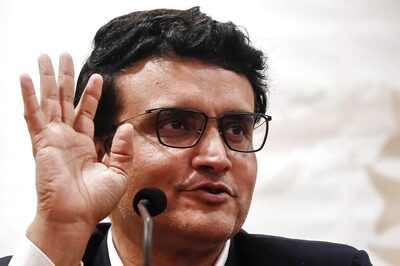
views
But I certainly will watch it and there are three good reasons for that.
First, the book on which it is based is simply amazing. Dan Brown's book hasn't been off the bestseller list since it was published. With reason. It's an intelligent thriller with a great hook while being intellectually stimulating.
The second reason is that Tom Hanks is probably my favourite Hollywood actor. Finally, because it's directed by Ron Howard. I watched him play Richie Cunningham in the serial Happy Days when I was a kid and, as an adult, I've truly enjoyed some of the films he has directed like A Beautiful Mind and Apollo 13.
The fundamental issue here, though, is that I have the choice of whether I want to watch The Da Vinci Code or not; whether I watch it this week or next month (it'll probably have an extended run due to the publicity it has received and I won't be surprised if it cracks the box office Holy Grail of $100 million in its opening weekend though I doubt that).
Yes, it's about choice. One that viewers in India may not enjoy given the environment of escalated intolerance of creative expression the country appears to be indulging. While the Catholic Church in India wants this film banned, the ban on Salman Rushdie's The Satanic Verses still remains in place. And in case some of you are sniggering over the narrowmindedness of the minority communities, wipe that grin off your faces. I won't be surprised if the knicker brigade seeks a ban on Deepa Mehta's Water, just as the Shiv Sena lumpens went after her film, Fire.
It's curious that when it comes to intolerance towards creative works, Indians are truly secular. Perhaps it's the call of equal opportunity banning.
Here's the contrast. The United States is a Christian majority country; there have been objections to the film, but no call for a ban, none at least I'm aware of. That applies to other Western democracies too including Great Britain, which actually has a blasphemy law in place.
This degree of intolerance towards the arts makes sense in countries like Saudi Arabia or China. In the former, the King can command editors of newspapers to cease publishing photographs of women since those can impact the morals of the youth. In the latter, censorship and outright bans are sciences. Memoirs of a Geisha can't be shown there since the Government frowns upon Chinese actresses playing the loathed Japanese and when Ang Lee wins an Oscar for Best Director and thanks his home country, Taiwan, that's bleeped out like a four-letter word.
But India isn't a theocracy or an autocracy. It has the good cracy - democracy.
Unfortunately, India's politicians will pander to anyone who can rustle up a dozen votes. So, they pamper those who are easily offended. So, I won't even be surprised if there's a version of a fatwa announced on Dan Brown because these crazies, usually politicians too, will want their 15 minutes of fame (actually more like 15 seconds of a bite on television). Remember the calls for killing MF Husain?
Ultimately, the debate over The Da Vinci Code is over choice. You should be able to choose whether you want to watch it or not. If you find it objectionable, you should criticize it and not spend your rupees on that movie ticket. But you need to respect that others should have a choice in the art they want to consume. That choice is their right in a democracy given the legality of the choice, of course.
Choice matters. For all you know it may turn out to be a perfectly awful film no one wants to watch anyway.first published:May 17, 2006, 19:26 ISTlast updated:May 17, 2006, 19:26 IST
window._taboola = window._taboola || [];_taboola.push({mode: 'thumbnails-mid-article',container: 'taboola-mid-article-thumbnails',placement: 'Mid Article Thumbnails',target_type: 'mix'});
let eventFire = false;
window.addEventListener('scroll', () => {
if (window.taboolaInt && !eventFire) {
setTimeout(() => {
ga('send', 'event', 'Mid Article Thumbnails', 'PV');
ga('set', 'dimension22', "Taboola Yes");
}, 4000);
eventFire = true;
}
});
window._taboola = window._taboola || [];_taboola.push({mode: 'thumbnails-a', container: 'taboola-below-article-thumbnails', placement: 'Below Article Thumbnails', target_type: 'mix' });Latest News
I won't be watching The Da Vinci Code when it releases in New York on Friday the 19th. There's a good reason for that: I'd hate to get stuck in a stampede as people rush to see the film.
But I certainly will watch it and there are three good reasons for that.
First, the book on which it is based is simply amazing. Dan Brown's book hasn't been off the bestseller list since it was published. With reason. It's an intelligent thriller with a great hook while being intellectually stimulating.
The second reason is that Tom Hanks is probably my favourite Hollywood actor. Finally, because it's directed by Ron Howard. I watched him play Richie Cunningham in the serial Happy Days when I was a kid and, as an adult, I've truly enjoyed some of the films he has directed like A Beautiful Mind and Apollo 13.
The fundamental issue here, though, is that I have the choice of whether I want to watch The Da Vinci Code or not; whether I watch it this week or next month (it'll probably have an extended run due to the publicity it has received and I won't be surprised if it cracks the box office Holy Grail of $100 million in its opening weekend though I doubt that).
Yes, it's about choice. One that viewers in India may not enjoy given the environment of escalated intolerance of creative expression the country appears to be indulging. While the Catholic Church in India wants this film banned, the ban on Salman Rushdie's The Satanic Verses still remains in place. And in case some of you are sniggering over the narrowmindedness of the minority communities, wipe that grin off your faces. I won't be surprised if the knicker brigade seeks a ban on Deepa Mehta's Water, just as the Shiv Sena lumpens went after her film, Fire.
It's curious that when it comes to intolerance towards creative works, Indians are truly secular. Perhaps it's the call of equal opportunity banning.
Here's the contrast. The United States is a Christian majority country; there have been objections to the film, but no call for a ban, none at least I'm aware of. That applies to other Western democracies too including Great Britain, which actually has a blasphemy law in place.
This degree of intolerance towards the arts makes sense in countries like Saudi Arabia or China. In the former, the King can command editors of newspapers to cease publishing photographs of women since those can impact the morals of the youth. In the latter, censorship and outright bans are sciences. Memoirs of a Geisha can't be shown there since the Government frowns upon Chinese actresses playing the loathed Japanese and when Ang Lee wins an Oscar for Best Director and thanks his home country, Taiwan, that's bleeped out like a four-letter word.
But India isn't a theocracy or an autocracy. It has the good cracy - democracy.
Unfortunately, India's politicians will pander to anyone who can rustle up a dozen votes. So, they pamper those who are easily offended. So, I won't even be surprised if there's a version of a fatwa announced on Dan Brown because these crazies, usually politicians too, will want their 15 minutes of fame (actually more like 15 seconds of a bite on television). Remember the calls for killing MF Husain?
Ultimately, the debate over The Da Vinci Code is over choice. You should be able to choose whether you want to watch it or not. If you find it objectionable, you should criticize it and not spend your rupees on that movie ticket. But you need to respect that others should have a choice in the art they want to consume. That choice is their right in a democracy given the legality of the choice, of course.
Choice matters. For all you know it may turn out to be a perfectly awful film no one wants to watch anyway.


















Comments
0 comment